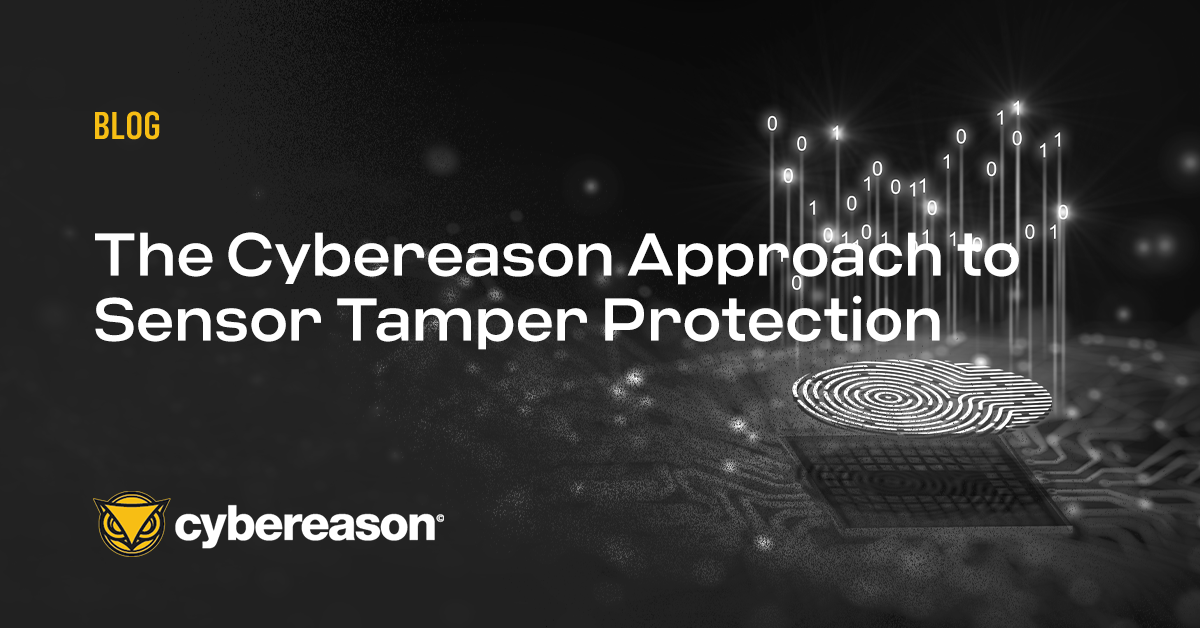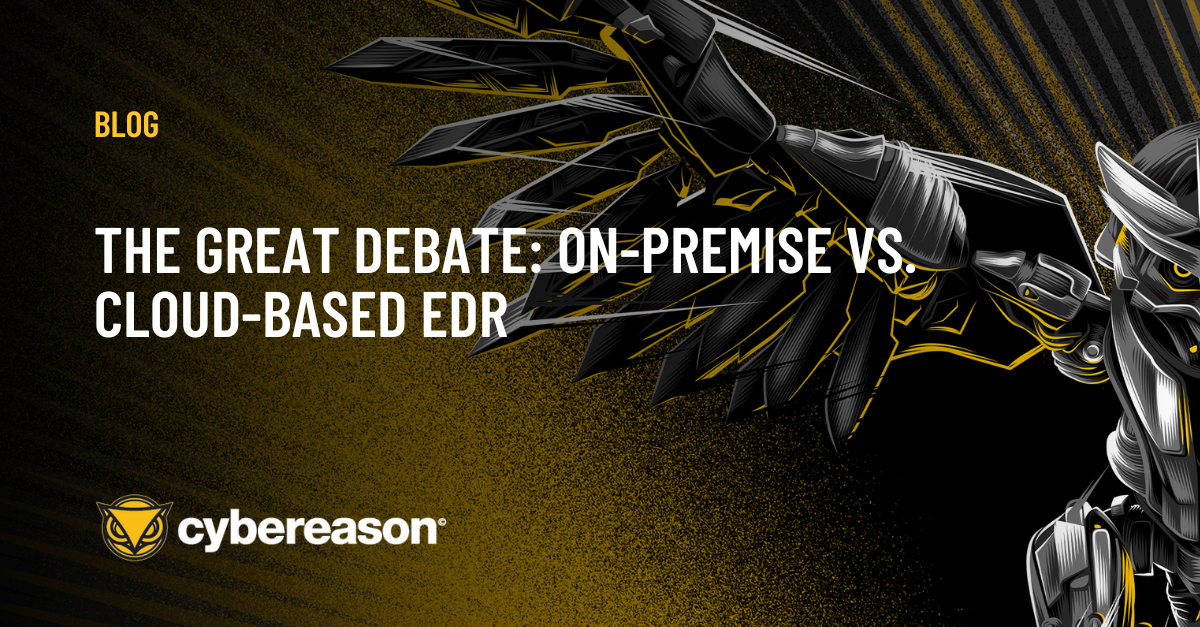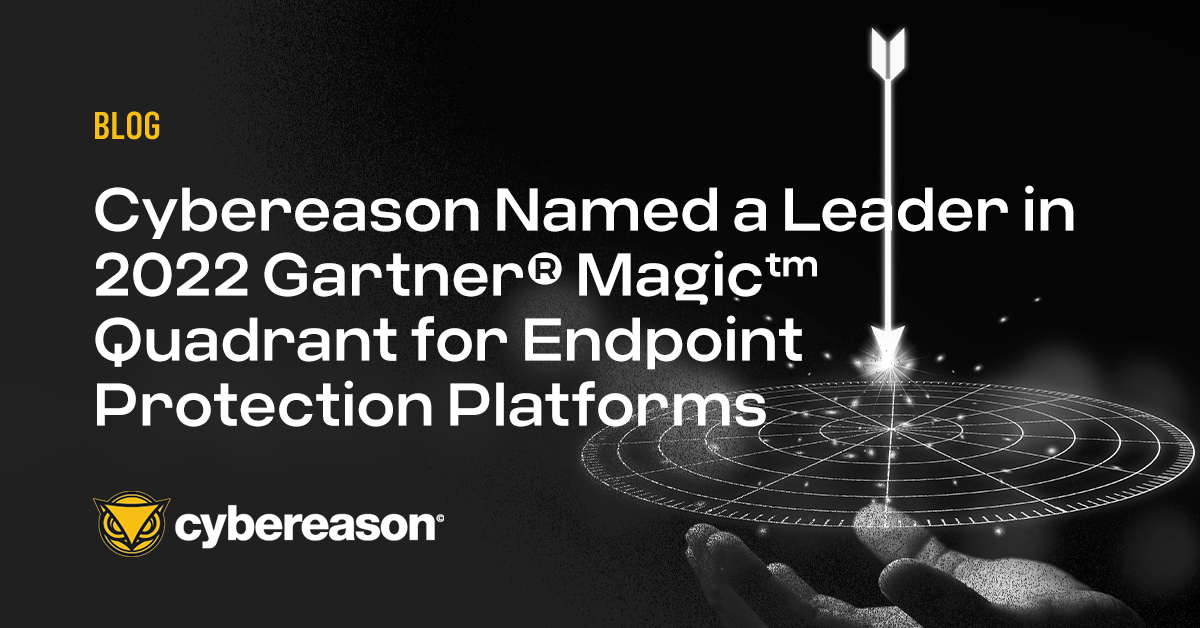
The Cybereason Approach to Sensor Tamper Protection
Cybereason leverages two distinct paths to protect deployed sensors in a customer environment: Self Protection and Intelligent/Proactive Protection...

Cybereason Team
Technology is rapidly advancing, and in today's fast-paced and ever-changing business world, organizations are under immense pressure to keep up with the latest developments while also meeting market demands.
The emergence of cloud and Software as a Service (SaaS) solutions has revolutionized the way businesses operate, with O'Reilly's recent Cloud Adoption report* revealing that over 90% of organizations are now utilizing the cloud, two-thirds utilizing public cloud services and 45% utilizing private cloud services. However, a recent survey conducted by Barclays* has shown that 83% of enterprises are planning to migrate their workloads from public cloud to private cloud. This raises the question: is there a significant shift in cloud strategy? Should businesses prioritize cloud-based or on-premise cybersecurity solutions, or are CIOs being influenced by a variety of strategic factors and opting for a hybrid approach?
Organizations must stay vigilant and proactive in their cybersecurity strategies. The decision of on-prem solutions versus cloud should not be based on trends or what everyone else is doing. It should be a well-thought-out decision. While cloud-based options offer convenience and scalability, on-premise solutions hold a unique advantage, particularly in environments with stringent security and regulatory requirements.
Before the widespread adoption of cloud technology, on-premises solutions were the standard for many organizations. Even today, these solutions remain essential for businesses, particularly in highly regulated industries such as finance and healthcare, where data privacy is of utmost importance. In the European Union, the Cyber Resilience Act has identified critical products that require heightened security measures, while the NIS2 directive has established a cross-border regulatory framework to establish a baseline for risk management and reporting.
In today's business landscape, strict compliance regulations and security concerns are on the rise, making it crucial for companies to prioritize having complete control over their data and infrastructure. The recent surge in data breaches and privacy scandals has only heightened the urgency of this need, leading companies to be more cautious about the storage and accessibility of their data. On-premises solutions offer a significant advantage in this regard, as they allow for customizing defenses to meet specific needs and compliance standards. This ensures that sensitive data remains within the company's premises, reducing the risk of data breaches.
While cloud solutions have their own set of benefits, they may not always provide the same level of security and control as on-premises solutions. This makes on-premises solutions a valuable option for businesses looking to safeguard their data. If your organization is unable to fully embrace public cloud services, Cybereason On-Prem offers a simplified solution for data and critical infrastructure compliance. With the flexibility to deploy in on-prem server rooms, private data centers, or private cloud environments, customers can confidently meet data compliance requirements and better protect their critical infrastructure.
Many organizations face difficulties when transitioning to the cloud due to their distinct needs, such as intricate IT infrastructures, offline networks, or outdated systems. These legacy systems, which are often stuck in "Maintenance Mode," make them vulnerable to advanced cyber attacks. However, the thought of migrating their outdated defenses to a modern deployment can be overwhelming. It is crucial to consider the unique needs and requirements of the business before making the shift to the cloud. In some cases, on-premises solutions may be a more suitable option as they can be tailored to fit specific needs.
Organizations that serve critical societal needs have a responsibility to their customers, shareholders, and host countries. However, when it comes to internet connectivity, there can be regional limitations that hinder access to cloud-based applications. This can significantly impact a business's productivity and efficiency, making on-premises solutions a more feasible option. Additionally, in countries with strict data sovereignty laws, companies may be required to store their data within the country's borders. This can present challenges for cloud solutions, as data is often stored in multiple locations. On-premises solutions offer the advantage of keeping data within the company's premises, ensuring compliance with local laws.
Financial Institution's strict data residency requirements and the highly sensitive nature of their data necessitated a unique approach that traditional solutions could not fulfill. However, with Cybereason On-Prem, the bank was able to resolve security issues that were previously unknown, thanks to its advanced detection capabilities. By utilizing cutting-edge machine learning and AI technology, Cybereason is able to identify threats without requiring an Internet connection, making it a crucial tool for the bank's operations in various countries.
So, which option is right for your business? Let's explore the key factors of cost, data control, and compliance.
When organizations are deciding between on-premise and cloud solutions, cost becomes a crucial factor. On-premise solutions involve a significant initial investment in hardware, software, and IT infrastructure. This upfront expense can be a barrier for some organizations, making it difficult to switch to the cloud. Furthermore, managing and maintaining their own hardware and software, as well as resolving any issues, can be a costly and time-consuming process. However, on-premise solutions may offer lower costs for compliance and security in regulated industries, as they keep sensitive data within secure, private environments.
Public clouds like AWS and Azure offer extensive scalability. but the rise of AI workloads has greatly impacted the economics of cloud computing. Public cloud providers often charge high rates for the powerful computing power needed for AI applications, making it financially unsustainable for many organizations. However, by bringing these workloads back to private clouds, businesses can regain control of their cloud costs.
Fortunately, there are now many technology companies and public cloud providers that offer a flexible range of options, including both on-premise and cloud solutions with a pay-as-you-go model or the choice of 1, 3, or 5 year plans. This allows businesses to have the best of both worlds, as they can choose the option that best fits their needs and budget. Whether an organization decides on an on-premise or cloud approach, payment plans ensure efficient resource allocation and effective cost management. However, it's important to note that while this model provides cost predictability, unexpected expenses may still arise due to unplanned workload spikes.
Data security is a crucial aspect of any business, with even greater importance for regulated industries. These industries, including healthcare, finance, and government agencies, are subject to strict laws and regulations. The data they collect and store is highly sensitive and can have severe consequences if it falls into the wrong hands. To ensure compliance, specific security protocols such as encryption and data access controls must be in place. Additionally, these industries must adhere to data privacy laws, such as HIPAA and GDPR, which adds another layer of complexity.
While external cyber threats are a significant concern for regulated industries, insider threats and human error can also pose a significant risk. Employees with access to sensitive data can unintentionally or maliciously compromise it, leading to data breaches. This is especially concerning in cases where employees have access to confidential information. Therefore, regulated industries must have strict data access controls in place to prevent unauthorized access.
Furthermore, with the increasing use of artificial intelligence and machine learning, there is a growing need for data privacy and ethical considerations in regulated industries. Companies must stay vigilant and continuously update their data security measures to stay ahead of potential threats. It is crucial for these industries to prioritize data security to maintain trust with their customers and stakeholders and avoid any legal and financial repercussions.
On-premises solutions offer the advantage of customizing defenses to meet specific needs and compliance standards, ensuring that sensitive data remains within the company's premises and reducing the risk of data breaches. This level of security and control may not always be achievable with cloud solutions, making on-premises solutions a valuable option for businesses. Cybereason On-Prem provides a single, class-leading EPP and EDR solution for organizations to keep their critical information protected in private, offline, and air-gapped networks. It protects data from unauthorized access with multi-layered protection, including software-driven antivirus, NGAV, EPP, and EDR.
On-premises solutions offer the advantage of customizing defenses to meet specific needs and compliance standards, ensuring that sensitive data remains within the company's premises and reducing the risk of data breaches. This level of security and control may not always be achievable with cloud solutions, making on-premises solutions a valuable option for businesses. Cybereason On-Prem provides a single, class-leading EPP and EDR solution for organizations to keep their critical information protected in private, offline, and air-gapped networks. It protects data from unauthorized access with multi-layered protection, including software-driven antivirus, NGAV, EPP, and EDR. Its machine-learning ability helps recognize attacker behavior, their use of tools and techniques, and flag activity for further investigation.
Ensuring compliance is crucial for businesses, especially those operating in highly regulated industries. Organizations must be able to demonstrate the location and security of their data while also maintaining effective defense strategies. Stringent requirements from regulatory bodies demand robust data security measures. However, compliance can be challenging in public cloud environments, where regulations such as PCI-DSS, HIPAA, and SOC2-Type II must be followed. On the other hand, on-premise solutions give businesses more control over their compliance measures, as they are solely responsible for meeting all necessary regulations. Despite this, cloud providers often have compliance certifications and dedicated teams to ensure their clients' data is stored and managed in accordance with industry regulations. It is crucial for organizations to carefully assess their compliance needs and the capabilities of their chosen solution before making a decision that best suits their requirements.
As an energy production company responsible for providing a significant portion of a country's electricity needs, data security is of utmost importance. The company's data must be secure, and their generation and distribution networks must be isolated from the public Internet. After thorough testing of all available on-premise EDR and EPP solutions, only Cybereason On-Prem was able to deliver greater network threat visibility and superior on-premise detection. With this solution in place, the company can remain compliant with local regulations that demand maximum uptime and operational resiliency.
Cybersecurity is a complex and ever-evolving world. However, with the right approach and partnerships, companies can effectively navigate these concerns and protect their sensitive data. By prioritizing data security and compliance, organizations not only safeguard their information but also maintain the trust and loyalty of their customers. It is crucial for companies to assess their needs, budget, and priorities in order to determine the best option for them, whether it be on-premises, in the cloud, or a hybrid solution.
“The reality is that enterprises are becoming more sophisticated in how they use cloud resources. They’re optimizing their workloads across different environments to get the best performance and cost outcomes.” – Michael Dell**
Regardless of the chosen approach, it is important to select a solution that aligns with the company's goals and to regularly review and adapt as needed. It is also essential for companies to take a proactive approach, utilizing advanced technology and staying updated on potential threats in order to effectively secure their data.
Whether you’re making the decision to retain your data on-premise, in the private or public cloud, or a combination, Cybereason can tailor a solution that helps you address the regulatory requirements you might encounter.
*Source : O'Reilly's Cloud Adoption report
** Source: Barclays CIO Survey

Cybereason is dedicated to partnering with Defenders to end attacks at the endpoint, in the cloud and across the entire enterprise ecosystem. Only the AI-driven Cybereason XDR Platform provides predictive prevention, detection and response that is undefeated against modern ransomware and advanced attack techniques. The Cybereason MalOp™ instantly delivers context-rich attack intelligence across every affected device, user and system with unparalleled speed and accuracy. Cybereason turns threat data into actionable decisions at the speed of business.
All Posts by Cybereason Team
Cybereason leverages two distinct paths to protect deployed sensors in a customer environment: Self Protection and Intelligent/Proactive Protection...

Cybereason is excited and honored to be positioned as a “Leader” in the recently released 2022 Gartner Magic Quadrant for Endpoint Protection Platforms.

Cybereason leverages two distinct paths to protect deployed sensors in a customer environment: Self Protection and Intelligent/Proactive Protection...

Cybereason is excited and honored to be positioned as a “Leader” in the recently released 2022 Gartner Magic Quadrant for Endpoint Protection Platforms.
Get the latest research, expert insights, and security industry news.
Subscribe